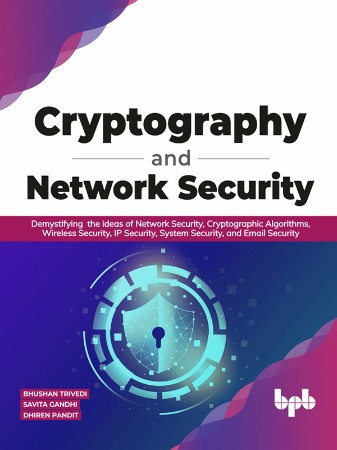Most Commented
Cryptography and NetWork Security: Demystifying the ideas of NetWork Security, Cry...




Description material

epub | 13.65 MB | English| | Author: Bhushan Trivedi, Savita Gandhi, Dhiren Pandit | Year: 2021
Description:
Exploring techniques and tools and best practices used in the real world.
KEY FEATURES
● Explore private and public key-based solutions and their applications in the real world.
● Learn about security protocols implemented at various TCP/IP stack layers.
● Insight on types of ciphers, their modes, and implementation issues.
DESCRIPTION
Cryptography and Network Security teaches you everything about cryptography and how to make its best use for both, network and internet security. To begin with, you will learn to explore security goals, the architecture, its complete mechanisms, and the standard operational model.
You will learn some of the most commonly used terminologies in cryptography such as substitution, and transposition. While you learn the key concepts, you will also explore the difference between symmetric and asymmetric ciphers, block and stream ciphers, and monoalphabetic and polyalphabetic ciphers. This book also focuses on digital signatures and digital signing methods, AES encryption processing, public key algorithms, and how to encrypt and generate MACs. You will also learn about the most important real-world protocol called Kerberos and see how public key certificates are deployed to solve public key-related problems. Real-world protocols such as PGP, SMIME, TLS, and IPsec Rand 802.11i are also covered in detail.
WHAT YOU WILL LEARN
● Describe and show real-world connections of cryptography and applications of cryptography and secure hash functions.
● How one can deploy User Authentication, Digital Signatures, and AES Encryption process.
● How the real-world protocols operate in practice and their theoretical implications.
● Describe different types of ciphers, exploit their modes for solving problems, and finding their implementation issues in system security.
● Explore transport layer security, IP security, and wireless security.
WHO THIS BOOK IS FOR
This book is for security professionals, network engineers, IT managers, students, and teachers who are interested in learning Cryptography and Network Security.
AUTHOR BIO
Prof. Bhushan Trivedi, Ph. D. is working as the Dean, Faculty of Computer Technology (FoCT) at the GLS University. He has two MOOCs, three international books, 100 odd research papers to his credit. He has conducted numerous workshops and seminar talks on pedagogy, research, online content preparation and management and various realms of security. He also has 6 patents registered with his Ph. D. students, out of which 4 in the area of security.
Savita Gandhi:
Dr. Savita Gandhi is Dean, Faculty of Computer Science and IT at GLS University. Prior to holding her current position she was the Director of the School of Computer Science and headed the Dept. of Computer Science at Gujarat University. Her current research areas include image processing, cryptography, data compression, mobile ad-hoc networks, data mining, artificial intelligence, machine learning where she leverages her strong background in mathematics and has well over 70 well-reviewed papers published. Along with research she has a strong passion for teaching and has contributed both at the national-level with MOOCs as well as in the local community.
Dhiren Pandit:
Dr Dhiren Pandit is working as an Assistant Professor in Mathematics at the Institute of Technology, Nirma University. He did his Doctorate from NIT Surat in the field of image processing and data mining. Due to his interdisciplinary work in the application of mathematics in computer science and experience, he is able to contribute to this project. He has authored several research papers in reputed journals.
KEY FEATURES
● Explore private and public key-based solutions and their applications in the real world.
● Learn about security protocols implemented at various TCP/IP stack layers.
● Insight on types of ciphers, their modes, and implementation issues.
DESCRIPTION
Cryptography and Network Security teaches you everything about cryptography and how to make its best use for both, network and internet security. To begin with, you will learn to explore security goals, the architecture, its complete mechanisms, and the standard operational model.
You will learn some of the most commonly used terminologies in cryptography such as substitution, and transposition. While you learn the key concepts, you will also explore the difference between symmetric and asymmetric ciphers, block and stream ciphers, and monoalphabetic and polyalphabetic ciphers. This book also focuses on digital signatures and digital signing methods, AES encryption processing, public key algorithms, and how to encrypt and generate MACs. You will also learn about the most important real-world protocol called Kerberos and see how public key certificates are deployed to solve public key-related problems. Real-world protocols such as PGP, SMIME, TLS, and IPsec Rand 802.11i are also covered in detail.
WHAT YOU WILL LEARN
● Describe and show real-world connections of cryptography and applications of cryptography and secure hash functions.
● How one can deploy User Authentication, Digital Signatures, and AES Encryption process.
● How the real-world protocols operate in practice and their theoretical implications.
● Describe different types of ciphers, exploit their modes for solving problems, and finding their implementation issues in system security.
● Explore transport layer security, IP security, and wireless security.
WHO THIS BOOK IS FOR
This book is for security professionals, network engineers, IT managers, students, and teachers who are interested in learning Cryptography and Network Security.
AUTHOR BIO
Prof. Bhushan Trivedi, Ph. D. is working as the Dean, Faculty of Computer Technology (FoCT) at the GLS University. He has two MOOCs, three international books, 100 odd research papers to his credit. He has conducted numerous workshops and seminar talks on pedagogy, research, online content preparation and management and various realms of security. He also has 6 patents registered with his Ph. D. students, out of which 4 in the area of security.
Savita Gandhi:
Dr. Savita Gandhi is Dean, Faculty of Computer Science and IT at GLS University. Prior to holding her current position she was the Director of the School of Computer Science and headed the Dept. of Computer Science at Gujarat University. Her current research areas include image processing, cryptography, data compression, mobile ad-hoc networks, data mining, artificial intelligence, machine learning where she leverages her strong background in mathematics and has well over 70 well-reviewed papers published. Along with research she has a strong passion for teaching and has contributed both at the national-level with MOOCs as well as in the local community.
Dhiren Pandit:
Dr Dhiren Pandit is working as an Assistant Professor in Mathematics at the Institute of Technology, Nirma University. He did his Doctorate from NIT Surat in the field of image processing and data mining. Due to his interdisciplinary work in the application of mathematics in computer science and experience, he is able to contribute to this project. He has authored several research papers in reputed journals.
Category:Computers, Science & Technology, Computers - General & Miscellaneous, Mathematics, Computer Security, Cryptography
Warning! You are not allowed to view this text.
Warning! You are not allowed to view this text.
Warning! You are not allowed to view this text.
Join to our telegram Group
Information
Users of Guests are not allowed to comment this publication.
Users of Guests are not allowed to comment this publication.
Choose Site Language
Recommended news
Commented



![eM Client Pro 9.2.1735 Multilingual [Updated]](https://pikky.net/medium/wXgc.png)





![[PORTABLE] Perfectly Clear WorkBench 4.1.2.2320 Multilingual (x64)](https://i.postimg.cc/nzGFmH9V/Perfectly-Clear-Work-Bench.png)
![Movavi Video Editor 24.0.2.0 Multilingual [ Updated]](https://pikky.net/medium/qhrc.png)

